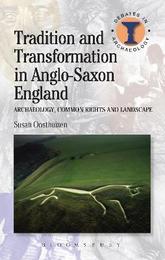
|
Tradition and Transformation in Anglo-Saxon England: Archaeology, Common Rights and Landscape
Hardback
Main Details
| Title |
Tradition and Transformation in Anglo-Saxon England: Archaeology, Common Rights and Landscape
|
| Authors and Contributors |
By (author) Dr Susan Oosthuizen
|
| Series | Debates in Archaeology |
|---|
| Physical Properties |
| Format:Hardback | | Pages:264 | | Dimensions(mm): Height 216,Width 138 |
|
| Category/Genre | British and Irish History |
|---|
| ISBN/Barcode |
9781472507273
|
| Classifications | Dewey:942.01 |
|---|
| Audience | |
|---|
| Illustrations |
5 illus
|
|
Publishing Details |
| Publisher |
Bloomsbury Publishing PLC
|
| Imprint |
Bloomsbury Academic
|
| Publication Date |
9 May 2013 |
| Publication Country |
United Kingdom
|
Description
Most people believe that traditional landscapes did not survive the collapse of Roman Britain, and that medieval open fields and commons originated in Anglo-Saxon innovations unsullied by the past. The argument presented here tests that belief by contrasting the form and management of early medieval fields and pastures with those of the prehistoric and Roman landscapes they are supposed to have superseded. The comparison reveals unexpected continuities in the layout and management of arable and pasture from the fourth millennium BC to the Norman Conquest. The results suggest a new paradigm: the collective organisation of agricultural resources originated many centuries, perhaps millennia, before Germanic migrants reached Britain. In many places, medieval open fields and common rights over pasture preserved long-standing traditions for organising community assets. In central, southern England, a negotiated compromise between early medieval lords eager to introduce new managerial structures and communities as keen to retain their customary traditions of landscape organisation underpinned the emergence of nucleated settlements and distinctive, highly-regulated open fields.
Author Biography
Dr Susan Oosthuizen is University Senior Lecturer in Historic Environment at the University of Cambridge, UK.
ReviewsHer proposition is an intriguing and important one and it introduces fresh new ideas into the discussion of how society evolved over the long duree that we call the medieval period. * SALON, the Newsletter of the Society of Antiquaries of London * This is an excellent book which is a valuable addition to the literature investigating the history and development of land use in the early medieval period ... the book not only investigates a theme rarely discussed fully elsewhere but also offers a useful exposition of current ideas about land use development in early medieval England. -- Della Hooke, The University of Birmingham, UK * Landscape History * This book joins a series of recent studies that have sought to explore the origins of landscapes characterized by open fields, and in particular asked why they became the dominant form of land management in England's 'central province' but not elsewhere . . . Overall, this book presents a novel hypothesis. -- Stephen Rippon, University of Exeter * Agricultural History Review * Displays a bold sweep of imagination and a deep engagement with the evidence. [The author] provides plenty of opportunities for further fruitful discussion of the economic and social history of the long eighth century. This is an important contribution to the study of this period. -- Michael D. Costen, University of Bristol, UK * The Economic History Review * A useful contribution to long-running debates about the origins of early medieval agrarian systems across southern England -- Nicholas Higham, University of Manchester, UK * Early Medieval Europe journal * In this nicely provocative contribution, Susan Oosthuizen asks for another rethinking of early medieval England. * The Society for Medieval Archaeology *
|